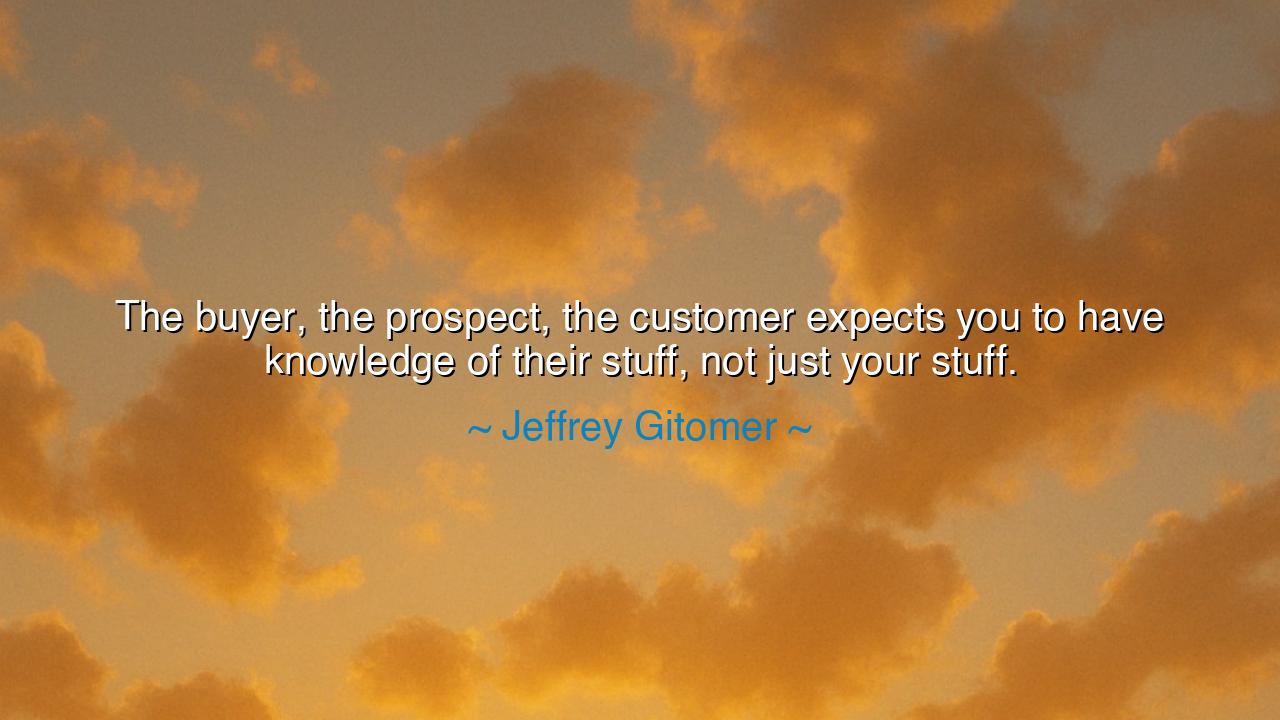
The buyer, the prospect, the customer expects you to have
The buyer, the prospect, the customer expects you to have knowledge of their stuff, not just your stuff.






"The buyer, the prospect, the customer expects you to have knowledge of their stuff, not just your stuff." Thus declared Jeffrey Gitomer, the merchant-sage of our modern age, who understood the secret laws of commerce as well as the ancients understood the laws of war. His words strike with clarity: to serve another, you must first know them. To win the trust of the buyer, to secure the loyalty of the customer, you must go beyond the narrow walls of your own craft and enter the wide halls of their needs, their fears, their desires. Knowledge of oneself is not enough; one must know the other, for in that knowing lies the path to true exchange.
The meaning of this saying is both practical and eternal. Too often, those who sell—whether goods, ideas, or services—focus only on themselves: their products, their features, their pride. But Gitomer reminds us that the prospect is not interested in your self-congratulation. They seek a mirror, a reflection of their own struggles and hopes. The wise seller, therefore, is not merely a talker of benefits, but a listener of stories. He learns the customer’s stuff, the landscape of their challenges, the heartbeat of their desires. Only then can he present his offering not as a stranger’s treasure, but as the key to their own locked door.
History gives us vivid proof. Consider the rise of Henry Ford. He did not merely perfect the automobile; he understood the hunger of the common worker, the farmer, the clerk—men and women who longed for mobility, for freedom on the open road. Ford’s genius was not only in engineering steel and wheels, but in perceiving the customer’s need for affordability and reliability. By aligning his knowledge of his craft with the reality of their lives, he created not merely a product, but a revolution in transportation. His wisdom was the same as Gitomer’s: know not only your stuff, but theirs.
Even in ancient times, this law prevailed. The merchants of the Silk Road did not carry their goods blindly across continents. They learned the tongues, the customs, the preferences of Persians, Indians, Arabs, and Chinese. They studied what each people valued: silk for emperors, spices for nobles, glassware for kings. Their success was not merely in what they brought, but in their deep knowledge of those they brought it to. Thus they grew rich, not because they sold what they had, but because they matched what they had to what others yearned for.
Gitomer’s words also carry a moral force. To know the customer’s stuff is to show respect. It is to honor them as human beings, not as targets or transactions. It is to say: "I see you. I hear you. I understand what weighs upon you." In this recognition lies trust, and from trust flows loyalty. Without it, even the finest product becomes hollow, for no one wishes to be unseen, no one wishes to be unheard. True commerce, like true friendship, is founded upon the courage to understand the other.
The lesson for us is plain: if you would persuade, first perceive. If you would lead, first listen. If you would sell, first serve. Do not bury yourself only in the knowledge of your own goods, your own talents, your own achievements. Instead, become a student of others—their struggles, their industries, their stories. For the moment you speak their language, the moment you address their true concerns, the walls of doubt fall away, and the bridge of trust is built.
Practically, this means cultivating curiosity. Before meeting a prospect, study their world. Ask questions that reveal, rather than speeches that boast. Learn to listen more than you speak, and let their answers guide your offering. In every interaction, shift your focus from self-promotion to shared vision. By doing so, you not only gain their business—you win their respect, and perhaps even their lasting partnership.
So I say unto you: remember Gitomer’s wisdom. In every exchange, the center is not you, but the other. Know your craft, yes—but more than this, know your people. For the master of commerce, like the master of life, is not the one who speaks the loudest of himself, but the one who sees most deeply into the heart of another. In that seeing, trust is born, and in trust, every lasting bond—be it of trade, of friendship, or of love.






AAdministratorAdministrator
Welcome, honored guests. Please leave a comment, we will respond soon